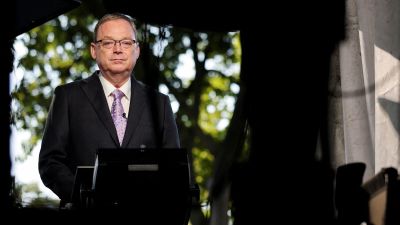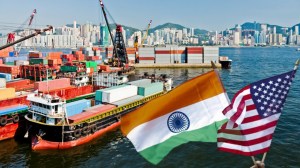DISMISSING FORMER Delhi Deputy Chief Minister Manish Sisodia’s bail plea, the Supreme Court on Monday said there is “material and evidence” which “tentatively” supports one of the charges under the Prevention of Money Laundering Act (PMLA) — that 14 wholesale liquor distributors earned “excess profit” of Rs 338 crore in about 10 months when the now-scrapped excise policy was in operation.
Sisodia was arrested by the Enforcement Directorate (ED) on March 9 this year, after he was held by the CBI on February 26.

While the bench of Justices Sanjiv Khanna and S V N Bhatti raised doubts on some of the charges levelled by the ED and refrained “from delving… in depth and detail” into some of the legal questions arising in the matter, it said: “However, there is one clear ground or charge in the complaint filed under the PMLA, which is free from perceptible legal challenge, and the facts as alleged are tentatively supported by material and evidence”.
Story continues below this ad
This comes as a setback to Sisodia, after the same bench, while hearing the case earlier this month, had underlined that stringent requirements have to be fulfilled for a charge under the PMLA. Questioning the ED about the admissibility of its evidence to link Sisodia with the money laundering offence, it had asked if the agency had any proof other than the statement of a co-accused-turned-approver. It had warned that the ED’s claims against Sisodia “will fall flat” after “two questions in the cross-examination”.
The ED had contended that Rs 338 crore was what accrued to the 14 wholesale distributors following the increase of their commission to 12 per cent under the Delhi Excise Policy 2021-22 (from 5 per cent under the old policy).
This, the ED had said, “would constitute proceeds of crime” and “were acquired, used and were in possession of the wholesale distributors who have unlawfully benefited from illegal gain at the expense of the government exchequer and the consumers/ buyers”.
While saying that Rs 70 crore was collected as a one-time licence fee from the distributors, the ED had said: “There is no logical correlation between the licence fee increase and the profit margin increase. Whereas this excess profit margin benefit could have been passed on to the consumers in the form of lower MRP. Contrary to the claim that the policy was meant to benefit the public or the exchequer, it was rather a conspiracy to ensure massive illegal gains to a select few private players/ individuals/ entities.”
Story continues below this ad
The SC noted that the chargesheet filed by the CBI under the Prevention of Corruption Act includes offences for unlawful gains to a private person at the expense of the public exchequer, and it is immaterial whether the person, being a public servant, accepts or attempts to obtain undue advantage directly or through a third party.
The court then went on to cite from the CBI chargesheet – that “the existing excise policy was changed to facilitate and get kickbacks and bribes from the wholesale distributors by enhancing their commission/ fee from 5% under the old policy to 12% under the new policy”.
“Accordingly, a conspiracy was hatched to carefully draft the new policy… Vijay Nair, who was the middleman, a go-between, a member of AAP, and a co-confidant of the appellant, Manish Sisodia, had interacted with Butchi Babu, Arun Pillai, Abhishek Boinpally and Sarath Reddy, to frame the excise policy on conditions and terms put forth and to the satisfaction and desire of the liquor group… Manish Sisodia was aware that three liquor manufacturers have 85% share in the liquor market in Delhi. Out of them, two manufacturers had 65% liquor share, while 14 small manufacturers had 20% market share… The policy favoured and promoted cartelisation. Large wholesale distributors with high market share, because of extraneous reasons and kickbacks, were ensured to earn exorbitant profits…Mahadev Liquor, who was a wholesale distributor for 14 small manufacturers, having 20% market share, was forced to surrender the wholesale distributorship licence… The excess amount of 7% commission/ fee earned by the wholesale distributors of Rs 338,00,00,000… constitute an offence as defined under Section 7 of the PoC Act, relating to a public servant being bribed…Vijay Nair had assured the liquor group that they would be made distributor of Pernod Ricard, one of the biggest players in the market. This did happen,” the CBI said in its chargesheet.
“In view of the aforesaid discussion and for the reasons stated, we are not inclined to accept the prayer for grant of bail at this stage,” the bench said. It, however, said the prosecution had assured that trial would be completed in six-eight months, and added that Sisodia could file a fresh bail application if the trial was protracted.
Story continues below this ad
The court also discussed some of the other charges against Sisodia. On the allegation that Rs. 2.2 crore was paid as bribe to Sisodia by Amit Arora, through middleman Dinesh Arora, the bench said it “is not a charge or an allegation made in the chargesheet filed by the CBI” and “it may be difficult to regard the alleged payment as a ‘proceed of crime’ under the PMLA”.
Regarding the ED’s claim that part of the proceeds of crime were used to fund the AAP’s poll campaign in Goa, the bench said the agency had said that “once the quantum of amount used in the election in Goa is ascertained, a decision to consider AAP as an accused under Section 3 (of PMLA) will be taken”.
Stating that the Aam Aadmi Party (AAP) was not being prosecuted in the case, the bench said “the charge that…Sisodia is vicariously liable in terms of Section 70 of the PMLA cannot be alleged and has not been argued”.
“Prima facie, there is lack of clarity, as specific allegation on the involvement of… Sisodia, direct or indirect, in the transfer of Rs 45 crore to AAP for the Goa elections is missing,” it said.
Story continues below this ad
The ED’s allegation that kickback of Rs 100 crore “was actually paid by the liquor group is somewhat a matter of debate,” the court said. It also questioned the ED’s “contention…that generation of proceeds of crime is itself possession or use of the proceeds of crime”.









